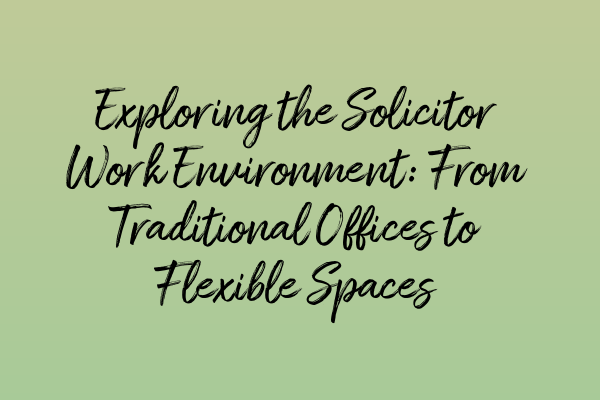Exploring the Solicitor Work Environment: From Traditional Offices to Flexible Spaces
As the legal profession evolves and adapts to modern needs, so too does the work environment for solicitors. Gone are the days of stuffy, traditional law offices with rows of cubicles and intimidating boardrooms. Today, solicitors have the opportunity to work in flexible and dynamic spaces that foster collaboration, creativity, and efficiency. In this blog post, we will explore the changing landscape of solicitor work environments, from traditional offices to flexible spaces.
The Rise of Flexible Working
The legal profession has traditionally been known for its rigid working hours and hierarchical structures. However, in recent years, there has been a shift towards more flexible working arrangements. Solicitors are no longer confined to the office from 9 to 5; instead, they have the freedom to work remotely, choose their own hours, and even work from different locations.
Flexible working offers solicitors the opportunity to achieve a better work-life balance, reduce commuting time, and work in environments that suit their individual preferences. This can lead to increased productivity and job satisfaction. With the advancements in technology, solicitors can easily access their case files, communicate with clients, and collaborate with colleagues regardless of their physical location.
If you’re interested in learning more about the legal aspects of property law, check out these related articles: Lease Extensions and Enfranchisement: Navigating Complex Legal Procedures, Demystifying Lease Laws in the UK: Legal Frameworks Explained, Understanding Rights of Way: A Guide for Property and Land Practitioners, SQE Property Syllabus: A Comprehensive Breakdown of Exam Topics, Solicitors Property Law: Key Principles and Practical Applications.
Coworking Spaces: Collaboration and Community
One of the emerging trends in the legal profession is the use of coworking spaces. These shared workspaces offer solicitors the opportunity to work alongside professionals from different industries, fostering collaboration and networking opportunities.
Coworking spaces often provide amenities such as meeting rooms, high-speed internet, and communal areas where solicitors can connect with like-minded professionals. These spaces promote a sense of community and enable solicitors to expand their professional network, potentially leading to new business opportunities and partnerships.
Additionally, coworking spaces can be cost-effective for solicitors, especially those who are just starting their own practice. Renting a traditional office space can be expensive, whereas coworking spaces offer flexible and affordable memberships, allowing solicitors to pay only for the space and services they need.
Virtual Offices: Embracing Technology
In today’s digital age, solicitors have the option to work from virtual offices. Virtual offices provide the benefits of a traditional office, such as a professional address and a dedicated phone line, without the need for a physical workspace. This flexibility allows solicitors to reduce overhead costs and work from anywhere.
Virtual offices utilize technology to provide solicitors with a range of services, including mail handling, call answering, and access to meeting rooms on an ad-hoc basis. These services can be customized to suit the individual needs of solicitors, ensuring that they have the support they require to run their practice efficiently and professionally.
Hybrid Models: Best of Both Worlds
While flexible and remote working options are on the rise, some solicitors still prefer the structure and stability of a traditional office environment. In response to this, many law firms and legal organizations are adopting hybrid models that combine the benefits of traditional offices with the flexibility of remote working.
For example, a law firm may have a central office where solicitors can work when they need to meet with clients or collaborate with colleagues. However, solicitors also have the option to work remotely for the majority of their time, whether it be from home, a coworking space, or a virtual office. This hybrid model allows solicitors to have the best of both worlds, maintaining a sense of stability and structure while also enjoying the benefits of flexibility.
In Conclusion
The traditional solicitor work environment is undergoing a significant transformation. Flexible working arrangements, coworking spaces, virtual offices, and hybrid models are reshaping the way solicitors work and interact with their colleagues and clients. Embracing these changes can lead to increased productivity, job satisfaction, and work-life balance for solicitors.
Are you interested in learning more about property law and other related topics? Check out these articles: Lease Extensions and Enfranchisement: Navigating Complex Legal Procedures, Demystifying Lease Laws in the UK: Legal Frameworks Explained, Understanding Rights of Way: A Guide for Property and Land Practitioners, SQE Property Syllabus: A Comprehensive Breakdown of Exam Topics, Solicitors Property Law: Key Principles and Practical Applications.


Leave a Reply